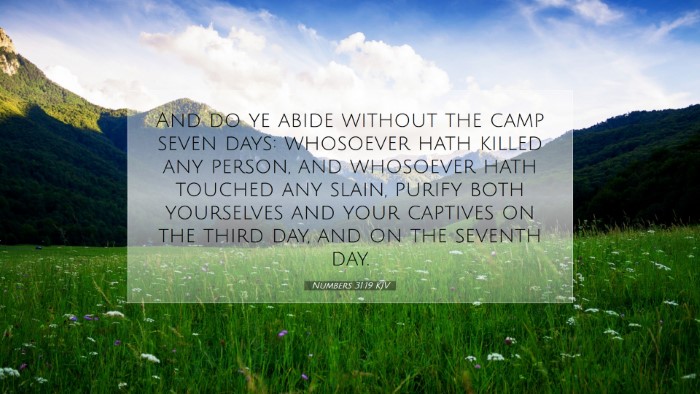Commentary on Numbers 31:19
Numbers 31:19 states: "And do ye abide without the camp seven days: whosoever hath killed any person, and whosoever hath touched any slain, purify both yourselves and your captives on the third day and on the seventh day."
Introduction
This verse comes from a pivotal moment in Israel's narrative following their conquest against Midian. The context is essential to understanding the instructions given to the soldiers regarding purification after the battle. The requirement for purification is not merely a ritualistic practice but is deeply embedded in the holiness code that governs Israelite life.
Purification After Battle
As we delve into Numbers 31:19, it is important to consider the reasons behind the purity laws. Albert Barnes remarks on the necessity of cleansing for those who have been involved in violence. In these moments of conflict, touching a slain body rendered a person unclean, reinforcing the idea that while warfare was sometimes necessary, it also demanded a return to holiness.
Imparting a Sense of Holiness
These instructions highlight the holiness that God demands from His people. Adam Clarke suggests that in warfare, the risk of spiritual contamination from violence was high, and thus the purification process was essential. It served both as a physical cleansing and a spiritual recommitment to God’s ways.
- Seven Days of Purification: The duration reflects a significant time of repentance and reflection.
- Third and Seventh Days: These timelines indicate completeness in God’s prescribed order; the third day points towards resurrection and the seventh day represents the sabbath rest.
Theological Implications
From a theological perspective, this passage speaks volumes about God’s demand for purity. Matthew Henry points out that although God permits war, He never condones the violence that accompanies human conflict. Instead, He provides a pathway to restoration. This purification helps to underscore the severity of sin and the need for atonement, positioning the Israelites to be received again into God’s presence.
Significance of the Camp
Staying outside the camp makes a clear separation between the unclean and the community. This boundary is significant as it illustrates how sin creates distance from the holy. Thus, the temporary exclusion serves as an important reminder of the nature of sin and its consequences. According to Clarke, this communal aspect also emphasizes collective accountability.
- Cleansing Required: No one is above the need for purification; all must seek to maintain holiness.
- Community Impact: The actions of individuals can affect the entire congregation, highlighting the importance of personal responsibility.
Historical Context
In examining the practicalities of this purification, it’s crucial to recognize the cultural context of ancient Israel. The soldiers had just returned from the battlefield, which would have been a traumatic experience. Matthew Henry indicates that God’s instructions provided mercy alongside justice by allowing a period of purification before reentry into the community.
Practical Application for Today
This verse urges leaders and believers to consider their own walk before God, particularly after engaging with sin, violence, or situations that afflict the spirit. Just as the soldiers had to purify themselves, so too must modern believers seek purification and restoration through repentance and seeking God’s grace.
- Reflection and Repentance: Believers are encouraged to pause and seek God's cleansing through confession.
- Restoration of Community: The collective nature of faith means accountability within the body of Christ, echoing the call for unity.
Conclusion
Numbers 31:19 serves as a profound reminder of the need for purity in the lives of believers. Through the practice of purification, the Israelites were reminded of their identity before God—a people set apart. Likewise, believers today are called to reflect on their life choices, seeking the grace of God to maintain their standing as holy before Him. In this way, the command to purify extends far beyond the physical act, calling for a deeper spiritual renewal.


